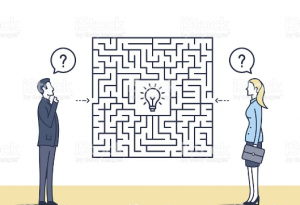LEADERSHIP DEVELOPMENT & EXECUTIVE COACHING
Leadership is a profession that many enter with minimal formal preparation. Executive coaching is a way for leaders to immerse themselves in highly focused, accelerated learning related to managing and leading people. The coaching relationship is like a one-on-one capstone seminar in leadership and personal effectiveness where an experienced or emerging leader gets a chance to shine a light on the neglected aspects of his/her education with the support of someone who is a well established leader and skilled educator.
The workplace becomes the learning laboratory with no need to go elsewhere for study and practice. Everyday human dilemmas of leading become the case studies. Coaches help current and emerging leaders examine their reactions to these dilemmas and analyze their performance, communication effectiveness, interpersonal skills and strategic thinking as well as that of their team’s. During this process leaders wind up affirming their values, clarifying their purpose and determining new actions to be used for competitive advantage.
 When you select a Strategic Partners coach you get a coach well versed in a multitude of methodologies designed to strengthen, sustain, and improve leaders’ capabilities. Our cadre of coaches has worked together as a team and in subgroups on a variety of large-scale organizational projects requiring both coaching and organizational development expertise. We believe the goal of coaching is to elevate the leader’s personal or team performance by helping him/her communicate more powerfully, build stronger relationships, develop grounded presence, and expand strategic agility and influence across organizational lines.
When you select a Strategic Partners coach you get a coach well versed in a multitude of methodologies designed to strengthen, sustain, and improve leaders’ capabilities. Our cadre of coaches has worked together as a team and in subgroups on a variety of large-scale organizational projects requiring both coaching and organizational development expertise. We believe the goal of coaching is to elevate the leader’s personal or team performance by helping him/her communicate more powerfully, build stronger relationships, develop grounded presence, and expand strategic agility and influence across organizational lines.
Most coaching engagements begin by assessing leadership skill and behavior. Each coach on our panel is certified to use a variety of assessment tools, including sophisticated multi-rater instruments (360’s). All of our coaches have the ability to help individuals interpret feedback data, the sensitivity required to make it safe to look at criticism, and the savvy to effectively manage resistance when it occurs.
The success of leadership coaching is largely dependent on the skills of the specific coach and his/her ability to help individuals understand their improvement needs and embrace change. A secondary success factor, which is difficult to ensure, is chemistry between the coach and the coaching candidate. Strategic Partners offers you a diverse choice of coach and a commitment to fit. Each coaching candidate will be matched to a coach to whom he/she can easily relate.
TEAM COACHING
Our coaches understand what is required to work successfully with groups, and how to assess current performance to determine the critical issues that demand team discipline. The coach’s role is to help new teams get off to a fast start or help struggling teams “get unstuck” and back on track.
 Coaches also work to reduce conflict, and to put a spotlight on performance relative to quality, innovation, customer service, re-engineering processes and building strategic alliances. Our objective is to equip teams with a flexible framework for developing and/or redefining their common mission, language and decision-making processes and to:
Coaches also work to reduce conflict, and to put a spotlight on performance relative to quality, innovation, customer service, re-engineering processes and building strategic alliances. Our objective is to equip teams with a flexible framework for developing and/or redefining their common mission, language and decision-making processes and to:
- Clarify all roles, including the coach’s role
- Create clear compelling goals defined by outcomes, not just activities and identify success measures/markers/milestones
- Design, test and install infrastructure and support systems that keep group members and the leader aligned and mutually accountable
- Work with the leader independently, behind the scenes, and within the team
- Ensure that when a team leader introduces new organizational directives he/she leaves enough “solution space” regarding deadlines, resource allocation and sub-goals so that mutual commitment can be created
- Manage conflict
- Foster re-commitment
- Keep team/group engaged with and accountable to stakeholders
GROUP COHORT COACHING
 Group cohort-style learning has become one of the most effective ways to develop leaders, because within a leadership development cohort, attention is turned from the better understood aspects of a leader’s role, such as: fiscal responsibility, accountability, strategy and execution and is instead placed on the ability to relate skillfully, provide fair treatment, develop and inspire others, manage triggers, increase the quality of employee engagement and cultivate an environment where people and innovation flourish.
Group cohort-style learning has become one of the most effective ways to develop leaders, because within a leadership development cohort, attention is turned from the better understood aspects of a leader’s role, such as: fiscal responsibility, accountability, strategy and execution and is instead placed on the ability to relate skillfully, provide fair treatment, develop and inspire others, manage triggers, increase the quality of employee engagement and cultivate an environment where people and innovation flourish.
In this learning format, master-level coach/facilitators customize and lead off-site monthly cohort meetings that offer leaders an opportunity to step away from day to day pressures, and join peers in focusing on the most relevant, difficult and high priority aspects of leadership—the parts of the job for which many feel under prepared.
When leaders step away from the office and spend time together, they quickly reconnect with what is most important, as well as the overarching aspects of their roles, such as holding a vision that provides for the welfare of the whole system, and being architects of their organization’s future. It is here where leaders tune-in to how to bring out the best in themselves and others, and find the courage necessary to take on unfamiliar or uncomfortable challenges.
Expected Outcomes
In our experience, cohort learning exponentially accelerates individual leader’s ability to perform in the following ways:
- Increases ability to stay focused on most vital leadership commitments and realign oneself with these obligations to increase clarity and decisiveness while reducing stress and distraction
- Builds leadership mindset and presence
- Expands strategies for building productive relationships with direct reports, peers, seniors, sponsors and others
- Deepens capacity to be effective in the face of difficult, sensitive, and urgent challenges by drawing on leadership principles/tools related to: self-care/energy management, conversational competency, trust building, boundaries, managing the personal insecurities of others, promise-based management, assertion, conducting crucial or difficult conversations, repairing breakdowns, inspiring others through storytelling and values-based messaging
- Builds a community and network of ongoing support that reduces the risk of isolation and burnout and increases collaboration, trust, responsiveness, creativity and job satisfaction
SPECIFIC COACHING CAPABILITIES
Using approaches that draw from the body of knowledge related to transformative change, appreciative inquiry, systems thinking, emotional intelligence, leadership, collaboration, conflict resolution, adult learning, integral theory, human development stage theory, and ontological and somatic coaching we educate our clients. We provide a common lexicon with which to discuss breakdowns in the face of high-stake complicated circumstances, and deliver coaching support to individual leaders and their teams to practice and reinforce learning.
Philosophically, we believe coaches need to minimally have solid theoretical knowledge in the following domains. We have chosen the following broad categories to define our work in organizations and to demonstrate more precisely our team’s capabilities, while highlighting the various ways we may help:
Behavioral Coaching
 Definition: Helping executives/leaders/managers increase effectiveness by achieving positive long-term change in interpersonal behavior, specifically by helping them to enhance relationships, increase ability to manage conflict and expand emotional intelligence. Working with our coaches to refine leadership behavior, coaching clients elevate their emotional intelligence and focus on increasing their executive presence by engaging in reflective practices involving self-observation and shifting limiting beliefs. Successful participants benefit from heightened self-awareness, and improved communication, impulse control, persistence, confidence, self-motivation, empathy, and social deftness. They learn how to manage and renew their energy in the face of ongoing change, stress, conflict, and scrutiny.
Definition: Helping executives/leaders/managers increase effectiveness by achieving positive long-term change in interpersonal behavior, specifically by helping them to enhance relationships, increase ability to manage conflict and expand emotional intelligence. Working with our coaches to refine leadership behavior, coaching clients elevate their emotional intelligence and focus on increasing their executive presence by engaging in reflective practices involving self-observation and shifting limiting beliefs. Successful participants benefit from heightened self-awareness, and improved communication, impulse control, persistence, confidence, self-motivation, empathy, and social deftness. They learn how to manage and renew their energy in the face of ongoing change, stress, conflict, and scrutiny.
With newfound awareness and skill, people take responsibility for themselves utilizing language to promote good will and bring about trust. They speak with good intention and purpose about others, dropping cynicism so they can demonstrate their curiosity, speak the truth constructively, and ask powerful questions. Most importantly, they experience a heightened sense of well-being and confidence, because they are more able to manage their personal anxiety, reactivity, and negative self-talk.
Clients can expect to gain self-awareness and skills in listening to differing points of view, collaborating with stakeholders across the enterprise, working through and solving complex problems with more ease, resolving conflict when it arises and effectively influencing others with whom they are in close relationship. Growth in these areas allows people to stay composed in the face of robust, passionate debate, thereby increasing engagement, and reducing alienation and isolation.
Strategy Coaching
Definition: Helping senior or executive level leaders new to leading a reorganized or acquired operation create a business strategy, or helping senior leaders shift their attention from leading an operation within the organization to executive-level leadership. When coaching for strategy development, the coach focuses on moving his/her client from tactical to strategic thinking.
 Focus is placed on articulating an innovative and inspiring vision and bringing the right people together to transform the vision into reality. Importance is placed on setting a tone and long-term direction around which people can align and coalesce. Coaching topics include execution, innovation, quality decision- making, and message development for enterprise-wide communication. When appropriate, emphasis is placed on how to contribute effectively at the most senior levels of the organization, moving attention from “me and my team” to “us as a leadership team” and broader enterprise-wide issues. The coach helps the client identify what the executive team is trying to accomplish together and how to contribute to that.
Focus is placed on articulating an innovative and inspiring vision and bringing the right people together to transform the vision into reality. Importance is placed on setting a tone and long-term direction around which people can align and coalesce. Coaching topics include execution, innovation, quality decision- making, and message development for enterprise-wide communication. When appropriate, emphasis is placed on how to contribute effectively at the most senior levels of the organization, moving attention from “me and my team” to “us as a leadership team” and broader enterprise-wide issues. The coach helps the client identify what the executive team is trying to accomplish together and how to contribute to that.
Coaching for Organizational Change
 Definition: Helping leaders specifically focused on changing the organizational culture and systems or attaining aggressive performance goals. The coach may at times take on the role of teacher, consultant, or architect. Successfully coaching for organizational change centers around the client being able to do the following: communicating so others “get it and spread it”, energizing the organization’s most valuable players, understanding the nature/territory of change, accelerating buy-in by designing events that will bring about rapid, widespread engagement and create a shared stake in success, breaking through obstacles/barriers, dealing with detractors, and doing what it takes to sustain overall excellence.
Definition: Helping leaders specifically focused on changing the organizational culture and systems or attaining aggressive performance goals. The coach may at times take on the role of teacher, consultant, or architect. Successfully coaching for organizational change centers around the client being able to do the following: communicating so others “get it and spread it”, energizing the organization’s most valuable players, understanding the nature/territory of change, accelerating buy-in by designing events that will bring about rapid, widespread engagement and create a shared stake in success, breaking through obstacles/barriers, dealing with detractors, and doing what it takes to sustain overall excellence.
Career Coaching
Definition: Helping individuals plan their careers to integrate with their lives. Here the focus is on personal growth with demonstrable value to the organization. This kind of coaching helps individuals and organizations make a connection between the holistic needs of knowledge workers and the bottom line needs of organizations.  Career coaching provides an individual with the opportunity to assess their skills, interests, values, and personality preferences in order to prepare for a career transition.
Career coaching provides an individual with the opportunity to assess their skills, interests, values, and personality preferences in order to prepare for a career transition.
The coach helps clients determine where their talents and interests fit best within the organization, and how to find and compete for a new job. Sometimes the focus of these conversations is about whether to stay or leave the organization. The coach ensures the client has considered a variety of options and is equipped to make confident decisions, as well as short-term and long-term plans, that take into account both organizational need and individual preferences.
